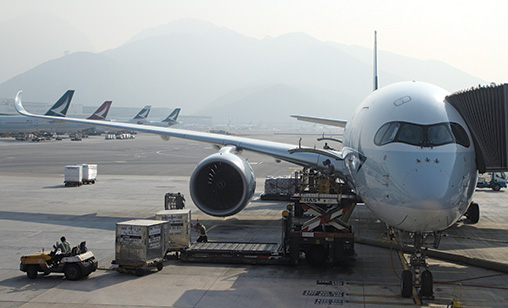Addendum
Cathay Pacific too important to fail decides Hong Kong government
June 1st 2020
A year ago, they would have been words a Cathay Pacific chairman would never have expected to utter. Read More » So it was a shock to many industry observers to hear the airline group’s chairman, Patrick Healy, say on the public record on June 9 that a HK$39.billion (US$5 billion) recapitilisation “was basically the only plan available to Cathay Pacific”.
“What would the alternative have been? Quite frankly, without this plan, the alternative would have been the collapse of the company,” he said during a specially convened webinar to explain the Hong Kong government’s support package for the airline group.
 |
“The reality, given the extent of the global pandemic and its impact on the aviation industry worldwide, is that the commercial debt markets are effectively closed to airlines today that do not have extensive government and shareholder support,” Healy said
Cathay Pacific Group CEO, Augustus Tang, added the airline had reached out to the Hong Kong government for support. “We asked for assistance from the government, so we made the request,” he said.
Hong Kong’s financial secretary, Paul Chan Mo-po, said: “Cathay Pacific took the initiative to seek the government’s financial assistance.
“If this challenge is not properly addressed, it will harm Hong Kong’s international hub status and adversely impact on other economic activities to the detriment of the overall interest of Hong Kong.”
The proposed recapitalisation package involves the Hong Kong government taking equity in the airline group, providing a HK$7.8 billion bridging loan and a rights issue major shareholders have pledged to support.
In a regulatory filing to the Stock Exchange of Hong Kong on June 9, the company said recapitalisation was in response to a series of unexpected events, including COVID-19, and would ensure it had sufficient liquidity to weather the current crisis.
Terms of the proposed recapitalisation, which requires the approval of shareholders at an extraordinary general meeting (EGM) on July 13, would allow Cathay Pacific to raise HK$19.5 billion through the issuing of preference shares and HK$1.95 billion (subject to adjustments) through warrants to subscribe for shares to Aviation 2020 Ltd, wholly owned by Hong Kong’s Financial Secretary Incorporated. Aviation 2020 Ltd also will provide the bridging loan facility to the group.
The government-backed entity would emerge with a 6.08% holding in Cathay Pacific and two “observer” positions on the board.
For the rights issue, Cathay Pacific shareholders would be offered seven rights shares for every 11 existing shares at a subscription price of HK$4.68 a share, a 47% discount to the last traded price of HK$8.81 a share, to raise HK$11.7 billion in fresh equity. Cathay Pacific major shareholders - Air China (29.99%), Swire Pacific (45%) and Qatar Airways (9.99%) - have committed to taking up all their available entitlements in the rights issue.
 |
Cathay Pacific’s regulatory filing also said longer term the airline group’s business model would be “re-evaluated”, with management to recommend to the board the “optimum size and shape” to meet the air travel needs of Hong Kong while keeping its financial status at a healthy level and meeting its responsibilities to shareholders.
More immediately, the board will bring in another round of executive pay cuts and a second voluntary special leave scheme for employees,” the company said.
International Air Transport Association director general and CEO, Alexandre de Juniac, said on June 8 that “financially 2020 will go down as the worst year in the history of aviation”.
“On average, every day of this year will add $230 million to industry losses, a total of $84.3 billion based on 2.2 billion passengers for 2020. Revenue will fall 50%, to $419 billion, from $838 billion in 2019,” he said.
“It is why government financial relief was and remains crucial as airlines burn through cash.”
IATA forecasts Asia-Pacific airlines, which were the first to feel the brunt of the COVID-19 outbreak, are expected to post the largest absolute losses worldwide in 2020.